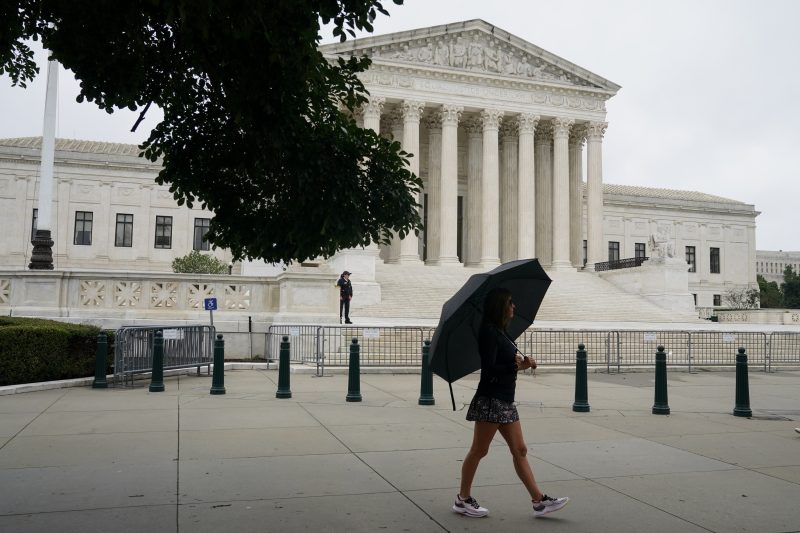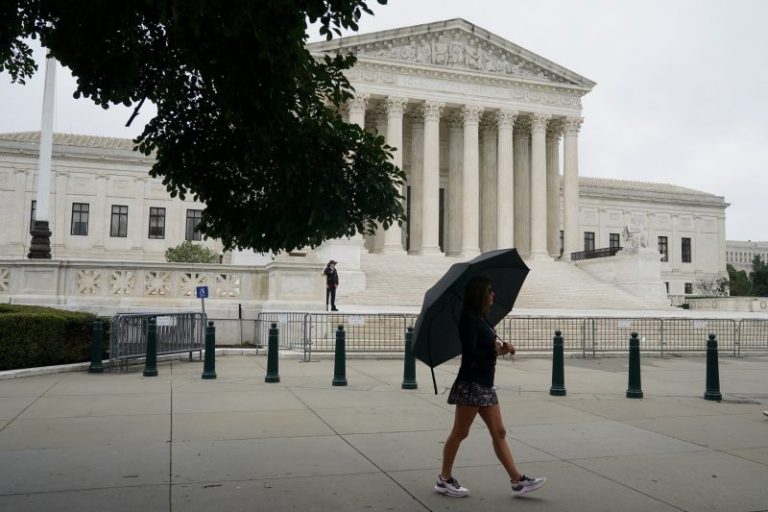
The Supreme Court on Friday upheld, but limited the reach of, a federal law that makes it a crime to encourage undocumented immigrants to stay in the United States.
In a 7-2 ruling, the justices reversed a lower court decision that found the decades-old law unconstitutional because it potentially outlawed more free speech than needed to achieve the goals of the measure.
Justice Amy Coney Barrett wrote the opinion, writing that the law must be read narrowly to forbid “only the intentional solicitation or facilitation of certain unlawful acts.” She rejected the argument that the statute prohibits a “‘substantial amount of protected speech’ — let alone enough to justify throwing out the law’s ‘plainly legitimate sweep.’”
Justices Sonia Sotomayor and Ketanji Brown Jackson dissented, with Jackson writing that the provision “prohibits so much protected speech that it appears” at odds with the court’s past decisions.
The law penalizes an individual who “encourages or induces an alien to come to, enter, or reside in the United States.”
Opponents said the language is so broad that it would criminalize speech protected by the First Amendment, putting at risk, for instance, charitable groups that feed the hungry; a family’s plan to have a grandmother continue to live nearby even though she is undocumented; or a doctor who informs a noncitizen patient that certain medical treatment is more readily available in the United States.
The Biden administration defended the measure and told the court that the text should be read more like a prohibition against intentionally seeking to aid and abet a crime. A majority of the justices agreed.
In response to the ruling Friday, the American Civil Liberties Union and the federal public defender’s office, which represented the defendant, said the court had narrowed the scope of the law by limiting its application to instances in which a defendant intentionally solicits or aids and abets specific crimes.
“The court’s decision reaffirms that the government can only make speech a crime under very stringent circumstances,” Carolyn Wiggin, an assistant federal defender, said in a statement. “As the Supreme Court interpreted the law at issue, when a friend, family member, or professional simply suggests a noncitizen remain in the United States, or informs them of their rights if they stay unlawfully, they cannot be prosecuted as a felon.”
Supreme Court 2023 decisions
End of carousel
The decision was announced the same day the court ruled in a separate immigration case, allowing the White House to continue to set deportation priorities. The justices are expected to announce the final decisions of the term next week.
The “encouragement” provision case that was decided Friday was brought by a person challenging his criminal conviction under the law. Helaman Hansen operated an organization called Americans Helping America Chamber of Commerce, which made nearly $2 million offering “adult adoption” to hundreds of noncitizens who had overstayed their visas. The organization falsely told the immigrants that they could gain citizenship through adult adoption, which the law does not allow.
Hansen was found guilty in 2017 of mail fraud, wire fraud and two counts of encouraging or inducing unlawful noncitizens for private financial gain. Hansen’s lawyers from the ACLU and federal public defender’s office said Friday that the U.S. Court of Appeals for the 9th Circuit should now order a new trial on those counts.
In dissent, Jackson said her colleagues had misinterpreted the broad language of the statute and its history as a narrow prohibition to avoid having to invalidate the law for infringing on free speech protections.
“It is neither our job nor our prerogative to retrofit federal statutes in a manner patently inconsistent with Congress’s choices,” wrote Jackson, who was joined by Sotomayor in a 21-page dissent — one page longer than the majority opinion.
“By acquiescing to the Government’s newly minted pitch to narrow this statute in order to save it, the majority undermines the goal of the overbreadth doctrine, which aims to keep overly broad statutes off the books in order to avoid chilling constitutionally protected speech.”
Barrett said, however, that Congress used the terms “encourage” and “induce” to refer only to conduct or speech soliciting or facilitating criminal violations of immigration law — not in a way that could apply to a broader swath of protected speech.
“Speech intended to bring about a particular unlawful act has no social value; therefore, it is unprotected by the First Amendment,” Barrett wrote.
The court’s opinion left for another day the question of whether an individual could be prosecuted for intentional solicitation or facilitation of civil immigration violations.
The case is U.S. v. Hansen.


Comments are closed.